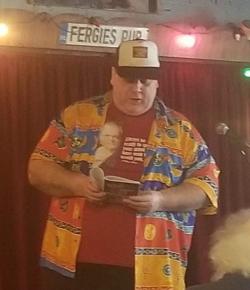SPACE IS THE PLACE (review)
Folder:
z NOTES FROM THE CAVERN
Space Is The Place: The Lives and Times of Sun Ra by John F Szwed is a serious biography of an often dismissed jazz icon. Szwed acknowledges the challenges of writing such a bio but he was willing to make the effort. He began the work shortly after Ra returned to Saturn in 1993. He really did some fine research as he had a lot of information on Ra's early life.
Sun Ra arrived on Earth in Birmingham, AL. His parents named him Herman. So the legend was born May 22, 1914 as Herman Poole Blount. He showed signs of being a prodigy right from the start. He was able to play music by ear and began composing at an early age. He was also a voracious reader and tackled many difficult books. Birmingham was still segregated in his early life so many of the black musicians had limited venues in which they could perform. This left a permanent impression on Herman.
It was the early move to Chicago that started him on his way to musical notoriety. He distanced himself from his family after the move. He often tried to conceal all information of this early life throughout the remainder of his career. Herman had early experience playing with Fletcher Henderson. This helped shape his views on music. He also began using the name Sonny as a performing name. He would retain a fondness for big band music even after he began composing his more far out numbers.
This period featured some of his earliest recordings. This is also when he made the transformation from Sonny Blount to Sun Ra. He started to implement many of his philosophical views into his band. His poems were often used as starting points for compositions. He was a strict band leader and tended to control the lives of his band members.
Ra's philosophy was forged through the early racism of the South as well as his studies of different cultures. He evolved many Afro-centric views which played off in the backdrop of his musical evolution. He also began to place greater demands on his band members. After the move to New York, the band usually lived together in the same house. Ra was an eccentric player even for Greenwich Village. He often walked around the streets in his robes.
The time in New York was fruitful even though he was often denounced by critics and other musicians. Some people like John Coltrane did get the music and praised it strongly. Ra also began his own record company at this time. His recordings were homemade. The labels and covers were also hand made and often varied even with the same release. Many of these are valuable collector's items today.
They would move to Philadelphia in the 70s and stay there for the remainder of Ra's existence. Much has been made of Ra's views. He was often cited as believing that he was never born and came from Saturn. Much of this is dealt with in the book. Szwed does a fine job of revealing that Ra often made these comments for the sake of interviewers or for shock value rather than legitimate belief. This helps grant a bit of perspective on some of the odder aspects of Ra's personality.
Szwed also gets into the business and financial angle of the Arkestra. Ra was not a good businessman and often found himself in debt. Bandmembers sometimes were not paid for gigs or recordings. Szwed gets into some of the associations that Sun Ra had. He had artistic collaborations with Amiri Baraka and Baba Olatunji at different points in his career. Fans of Pharoah Sanders might be interested to know that Sun Ra is the one who talked him into changing his name from Farrell Sanders to Pharoah Sanders.
The whole arrangement of the band living together seems odd. There were numerous longtime members like John Gilmore, Tommy Hunter and Marshall Allen who stayed with Ra for decades. Some of these members did occasionally leave Ra but always came back. Allen and Hunter were helpful in providing information for the book.
This is a very good book for the Sun Ra fan. I had very little knowledge of Ra beyond the discs I own. With this book, knowledge of his childhood and early career helped shed light on his eccentricities. I also felt that Szwed does deal with Ra as a flawed human being. The controling aspects of his personality show through the text. He also discusses some of the paranoid elements that existed in Ra's personality.
Szwed also does a fine job placing Sun Ra within the jazz tradition. He correlates Ra's music with other avant garde performers like Archie Shepp and Cecil Taylor among others. He even places the Arkestra within the counterculture context of the 60s. He often crossed over to fans of rock groups like Pink Floyd and other psychedelic acts.
There is a small picture section from different periods of his life. There is a good discography in the back of the book. This will help interested fans in seeking out recordings. There is also a bibliography which includes information for those interested in Ra's poetry.

Back To Saturn
You had to give us Herman P. Blount? Make a great character's name in a sci-fi short story actually. I will investigate the poetry and resume listening to the music, if my less adapted avante garde ears can tolerate the octaves. Let cha know - thanks for sharing. - allets -